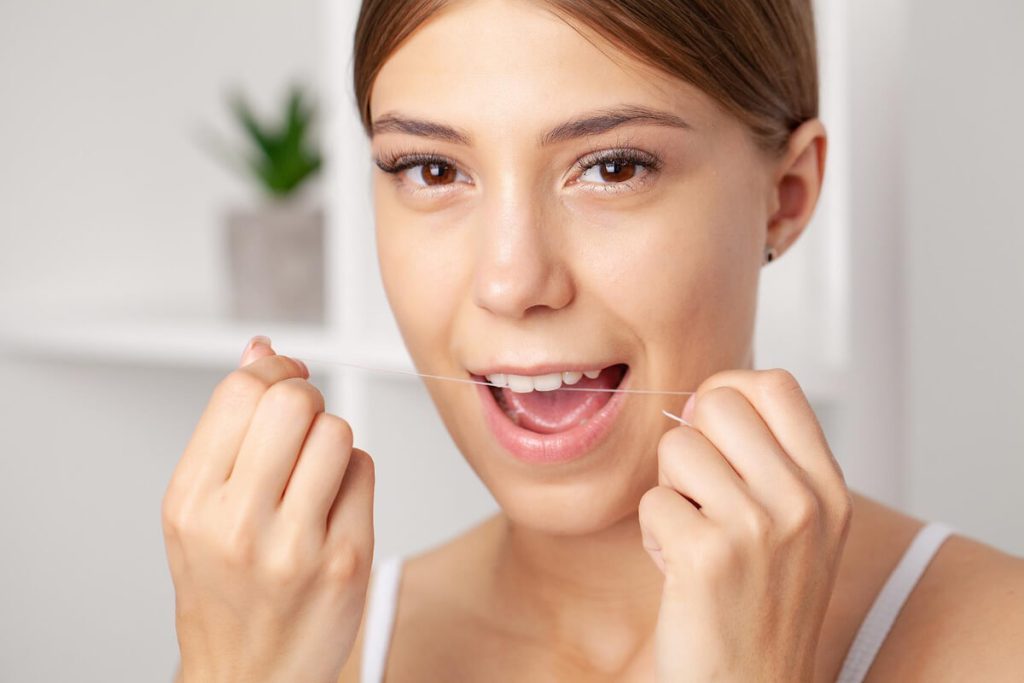Why is flossing important?

Flossing is crucial for maintaining oral health because it cleans the surfaces between your teeth that a toothbrush can’t reach.
You may have recently visited your dentist and been reminded to floss more, or perhaps you know you should but aren’t consistent with it.
We will explore the importance of flossing, the consequences of neglecting it, the best practices for flossing, and some common questions related to this essential oral hygiene practice.
#1. Flossing: An Overview
Flossing involves using dental floss to clean the teeth. While flossing is the most common method, other tools like interdental brushes, holders, and water flossers can also be practical.
According to the Australian Dental Association, while 80% of Australian adults brush their teeth twice daily, only 25% floss daily. This means three-quarters of adults miss out on the benefits of regular flossing, leaving their oral health at risk.
#2. Why Should I Floss? Why is Flossing Important?
Flossing helps keep gum disease and tooth decay at bay by removing food particles and bacteria between teeth. Eating daily can cause tooth plaque, a sticky layer of bacteria, to build up quickly.
If not routinely removed, harmful bacteria that flourish in plaque can lead to cavities and gum disease. Research has shown that flossing and brushing significantly reduce gingivitis (gum inflammation) compared to brushing alone.
Regular flossing can reduce periodontal disease, tooth decay, and tooth loss for older adults.
#3. When Should I Floss? How Often Should I Floss?
Everyone should floss at least once a day, ideally at night, to remove the day’s buildup of food and plaque. If you have gum disease, flossing after every meal is recommended.
Flossing before or after brushing can effectively clean your teeth and gums.
#4. Why Does Flossing Cause My Gums to Bleed?
Bleeding gums usually indicate plaque accumulation rather than over-flossing. When plaque accumulates, it attracts germs that your body fights off by sending blood to the area, causing bleeding.
Regular flossing and brushing can reduce plaque and, consequently, gum bleeding. If your gums bleed when you floss, it’s a sign to floss more, not less.
#5. How Do I Floss? How to Floss?
Effective flossing involves a few simple steps:
- Get a piece of floss about 45 cm long and grip it between your thumbs and index fingers.
- Use a gentle side-to-side motion to move the floss between your teeth.
- Move the floss up and down along the tooth surfaces, reaching below the gumline.
- Repeat for each tooth, cleaning the gumline where plaque can get trapped.
#6. What Type of Floss Should I Use? Are there alternatives to flossing if I find it hard to floss?
There are many types of floss, including waxed, unwaxed, flavoured, and unflavored.
Choose the one that feels most comfortable for you. If traditional flossing is challenging, alternatives include:
- Flossettes: Plastic handles with a short piece of floss.
- Interdental Brushes: Small brushes designed to clean between teeth.
- Floss Holders: Plastic devices that hold the floss for easier use.
- Water Flossers are electronic devices that use pressurised water to clean between teeth. They are ideal for people with braces, implants, or crowns.
#7. At What Age Should Children Start Flossing?
Children should start flossing as early as possible, ideally around age 6, when they begin losing baby teeth and gaining manual dexterity.
Starting early helps establish good habits and prevents tooth decay in the gaps between their teeth. Parents should model flossing behaviour to encourage their children.
#8. Do Water Flossers Work?
Yes, water flossers are effective. Some studies show they can be as practical or even more effective as regular flossing. For example, a study in the Journal of Clinical Dentistry done in 2013 revealed that a Waterpik user got a 74. 4% reduction in plaque compared to 57.
Another study demonstrated that the consumption of RUT Consortia significantly reduced the plaque level by 4% compared to 57%. A 7% decrease was found for regular floss users as compared to the first-time flossers. Water flossers benefit individuals with poor manual dexterity or orthodontic appliances.
Flossing is crucial to keeping your mouth healthy. By eliminating food particles and plaque from the spaces between teeth, it prevents gum disease and tooth decay. Whether you use traditional floss, a fossette, an interdental brush, or a water flosser, the key is to clean your teeth regularly.
Oral Health in Seven Hills
Don’t wait for your next dental appointment to start flossing! Today, incorporate flossing into your daily routine to ensure a healthy, bright smile.
If you have questions or need personalised advice, visit My Local Dentists Seven Hills. Our friendly team is ready to help you achieve optimal oral health.
We offer No-Gap dental check-ups, cleans, fluoride treatment, and X-rays for all patients with dental cover on their private health fund. We accept all significant health funds!
This means no cost shifting to you and your family since you will not have to pay any single dollar from your pocket.
*The No Gap Offer applies to patients who have other private health insurance to cover dental fees.
Contact your Seven Hills dentist at (02) 8605 1696 or schedule an appointment online.
We are located at Shop 55, (Ground Floor) Seven Hills Plaza, 224 Prospect Hwy, in Seven Hills.
